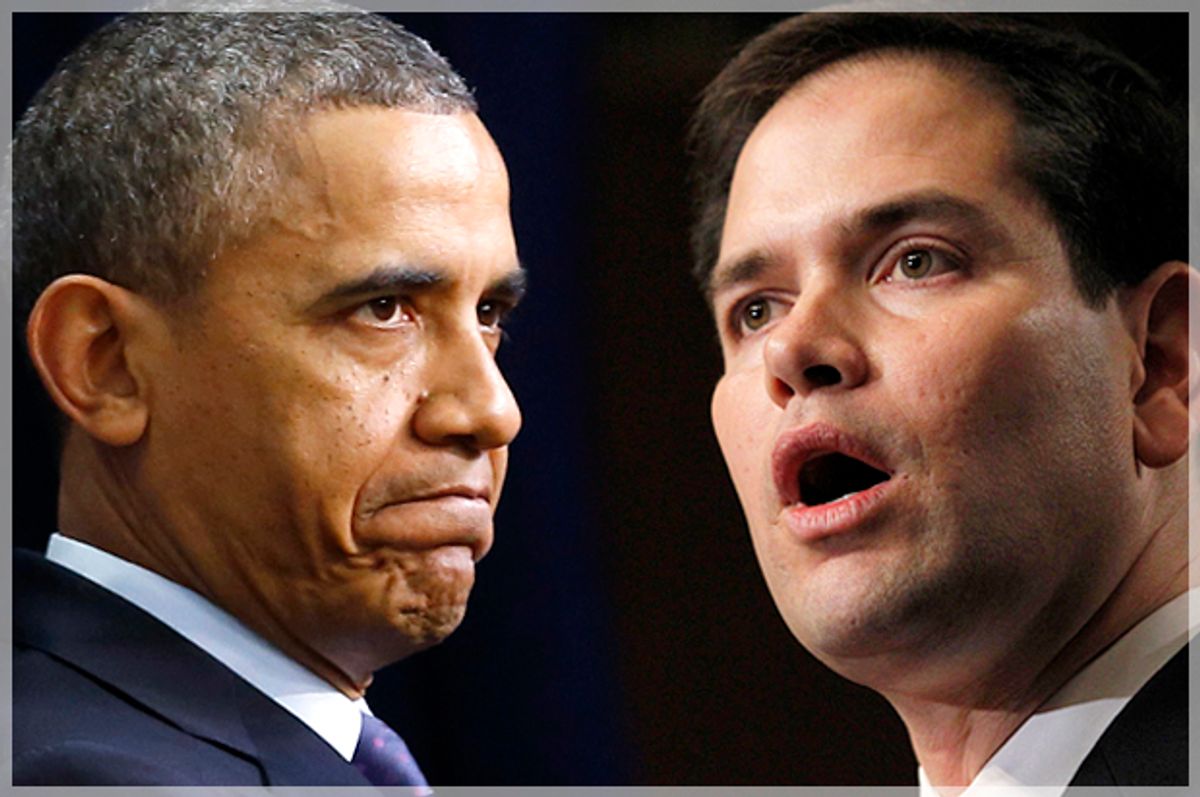A Tuesday Senate hearing featuring Gen. Martin Dempsey, chairman of the Joint Chiefs of Staff, did not go especially well for the White House's war-messaging operation. President Obama has been explicit in ruling out the deployment of ground combat troops to Syria and Iraq. But it didn't take Senate inquisitors all that much effort to get Dempsey to spill out scenarios in which he would recommend to the president the use of "military ground forces." At that point, all that stands between a counterterrorism war-esque type operation and a real live ground war in Syria and Iraq is the president's judgment. This is problematic.
Dempsey tried simultaneously to endorse the president's plan while being honest about where the mission could lead. Discordant sound bites ensued:
“My view at this point is that this coalition is the appropriate way forward. I believe that will prove true,” he said. “But if it fails to be true, and if there are threats to the United States, then I of course would go back to the president and make a recommendation that may include the use of U.S. military ground forces.”
Any future commitment of American personnel on the ground could put Mr. Obama in a difficult position, as he has repeatedly insisted that no American troops would engage in the battlefield, and Gen. Dempsey sought to explain the apparent contradiction.
“His stated policy is that we will not have U.S. forces in ground combat,” General Dempsey said, adding, “He has told me as well to come back to him on a case-by-case basis.”
White House press secretary Josh Earnest jumped in to downplay Dempsey's remarks. It was a bit of a mealy-mouthed mess. According to the pool report:
"As was clear [from] General Dempsey's remarks he was referring to a hypothetical scenario in which there might be a future situation in which he might make a tactical recommendation to the president as it relates to... the use of ground troops."
Earnest said it was the responsibility of the military to plan for a wide range of contingencies.
"[I]t is also the responsibility of the commander in chief to set out a clear policy. The president has been clear what that policy is."
He said that the president's policy of putting no boots on the ground has not changed.
"What he has been very specific and precise about is he will not deploy ground troops in a combat role into Iraq or Syria."
OK.
We understand that Gen. Dempsey is not saying he wants ground troops now, and that it's his job to plan for every hypothetical scenario. And we also truly believe President Obama when he says that he does not want and does not plan to deploy ground combat forces to Iraq and Syria. He thinks that would be a really bad idea. And perhaps he's convinced himself that there's no scenario in which he would ever do such a thing.
But what if he changes his mind? What if those hypothetical scenarios become the reality?
We also know that the strategy is a long-term one, probably lasting somewhere between three and infinity years. (Odds are, closer to infinity.) This takes us easily into 2017, when someone else will occupy the Oval Office. And so President Marco Rubio or Jeb Bush or Chris Christie or Joe T. Plumber or, um, Hillary Clinton moves into the White House and decides, before even unpacking the suitcases, that they want to deploy 250,000 ground troops to Iraq and Syria to start things off with a bang and "restore American values to the world."
Now that's a hypothetical scenario worth planning for. And we have members of Congress available, right now, to do the planning.
Congressman Adam Schiff has introduced an Authorization for Use of Military Force that appears to fit the bill. It would authorize the president to continue airstrikes against ISIS in Iraq and launch airstrikes against ISIS in Syria. It would also sunset the 2002 AUMF for Iraq immediately. Both the 2001 AUMF (against al-Qaida and affiliates) and the new AUMF against ISIS in Syria and Iraq would sunset in 18 months, and Congress could vote again then on whether to renew them. And, crucially, it would not authorize the president to deploy "ground forces in a combat role." It does leave some flexibility for other, specialized "boots on the ground," such as "special operations forces or other forces that may be deployed in a training, advisory, or intelligence capacity."
Schiff's proposal, or something like it, would put the president's strategy against ISIS on more solid legal footing and prevent him, or the next president, from deploying ground troops in the event of some hypothetical (/totally likely to occur) scenario. Obama or the next president obviously would be able to go to Congress and ask for the authority to deploy ground troops. But they would have to go to Congress. Maybe, as Digby argues, the president will always get whatever war-making powers (s)he wants from Congress. But here's the thing: maybe not?
President Obama may not think that he'd ever in a million-bajillion years come to the point where he'd want to send ground troops to fight ISIS. Nice to hear. But let's apply a straitjacket just to be sure.

Shares